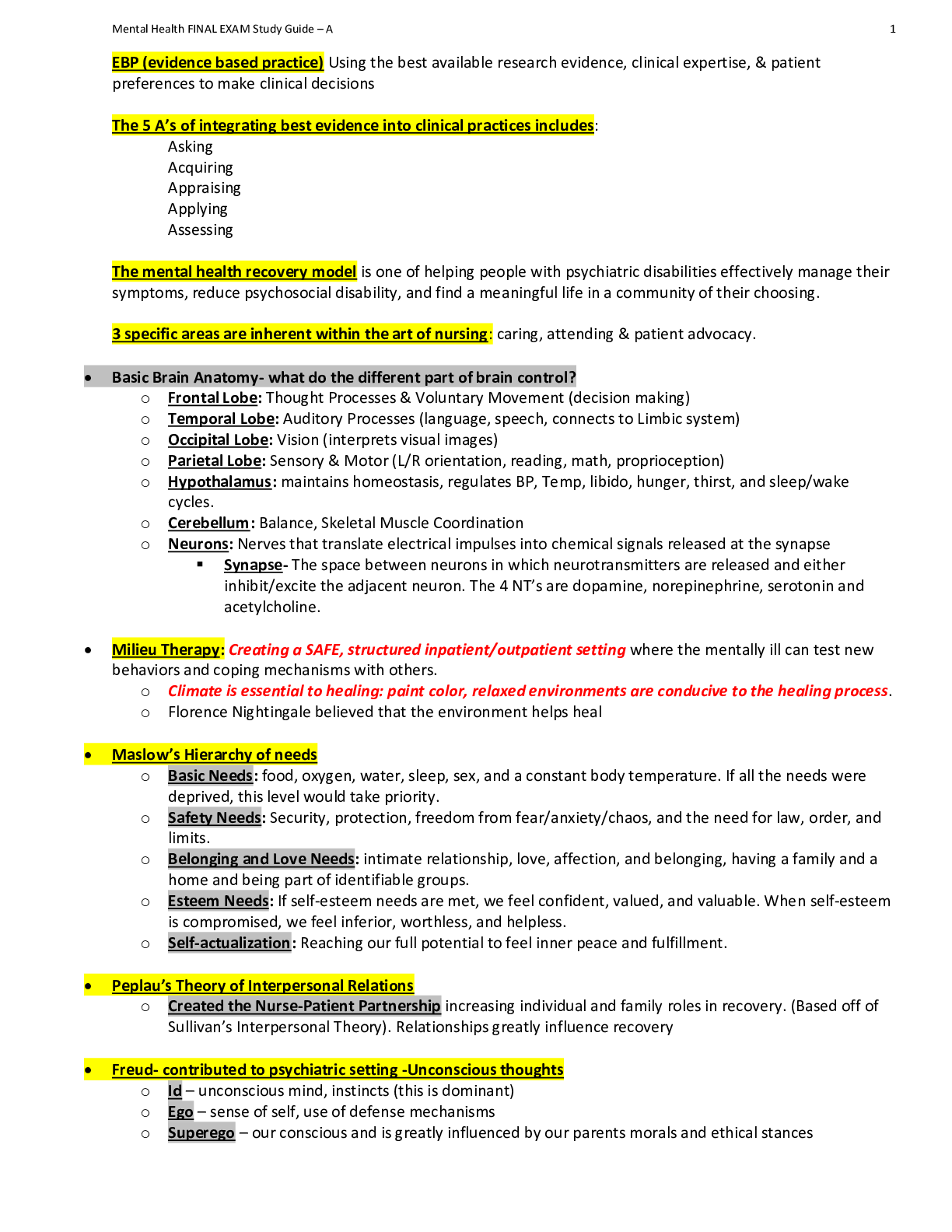EBP (evidence based practice) Using the best available research evidence, clinical expertise, & patient
preferences to make clinical decisions
The 5 A’s of integrating best evidence into clinical practices includes:
Asking
Acquiring
Appraising
Applying
Assessing
The mental health recovery model is one of helping people with psychiatric disabilities effectively manage their
symptoms, reduce psychosocial disability, and find a meaningful life in a community of their choosing.
3 specific areas are inherent within the art of nursing: caring, attending & patient advocacy.
Basic Brain Anatomy- what do the different part of brain control?
o Frontal Lobe: Thought Processes & Voluntary Movement (decision making)
o Temporal Lobe: Auditory Processes (language, speech, connects to Limbic system)
o Occipital Lobe: Vision (interprets visual images)
o Parietal Lobe: Sensory & Motor (L/R orientation, reading, math, proprioception)
o Hypothalamus: maintains homeostasis, regulates BP, Temp, libido, hunger, thirst, and sleep/wake
cycles.
o Cerebellum: Balance, Skeletal Muscle Coordination
o Neurons: Nerves that translate electrical impulses into chemical signals released at the synapse
Synapse- The space between neurons in which neurotransmitters are released and either
inhibit/excite the adjacent neuron. The 4 NT’s are dopamine, norepinephrine, serotonin and
acetylcholine.
Milieu Therapy: Creating a SAFE, structured inpatient/outpatient setting where the mentally ill can test new
behaviors and coping mechanisms with others.
o Climate is essential to healing: paint color, relaxed environments are conducive to the healing process.
o Florence Nightingale believed that the environment helps heal
Maslow’s Hierarchy of needs
o Basic Needs: food, oxygen, water, sleep, sex, and a constant body temperature. If all the needs were
deprived, this level would take priority.
o Safety Needs: Security, protection, freedom from fear/anxiety/chaos, and the need for law, order, and
limits.
o Belonging and Love Needs: intimate relationship, love, affection, and belonging, having a family and a
home and being part of identifiable groups.
o Esteem Needs: If self-esteem needs are met, we feel confident, valued, and valuable. When self-esteem
is compromised, we feel inferior, worthless, and helpless.
o Self-actualization: Reaching our full potential to feel inner peace and fulfillment.
Peplau’s Theory of Interpersonal Relations
o Created the Nurse-Patient Partnership increasing individual and family roles in recovery. (Based off of
Sullivan’s Interpersonal Theory). Relationships greatly influence recovery
Freud- contributed to psychiatric setting -Unconscious thoughts
o Id – unconscious mind, instincts (this is dominant)
o Ego – sense of self, use of defense mechanisms
o Superego – our conscious and is greatly influenced by our parents morals and ethical stances
Mental Health FINAL EXAM Study Guide – A 2 Erickson’s
o Trust vs. Mistrust (infant 0- 1 ½) trust developed if caregivers give affection, love, care, attention, and
reliability. (Feeding)
o Autonomy vs. Shame (toddlers 1 ½ - 3) kids need to develop a sense of personal control. (Toilet
Training)
o Initiative vs. Guilt (children 3-6) children need to have power to explore their environment and not
receive disapproval from parents. (Exploration)
o Industry vs. Inferiority: (school aged kids 6-12) Kids dealing with new social and academic demands.
Success leads to a sense of competence. (School)
o Identity vs. Role Confusion (teens 12-20) Teens need to develop self-identity and personal identity to
stay true to themselves. (Social Relationships)
o Intimacy & Solidarity vs. Isolation (young adults 20-30) Young Adults need to form intimate, loving
relationships. (Relationships)
o Generativity vs. Self-Absorption: (adults 30-65) Need to create/nurture things by having children.
(Work & Parenthood)
o Integrity vs. Despair (elderly 65+) Need to look back and feel fulfilled by accomplishments; have wisdom
and no regrets (Reflection on Life)
Sullivan Personalities are influenced during childhood and mostly by the MOTHER.
Read More


